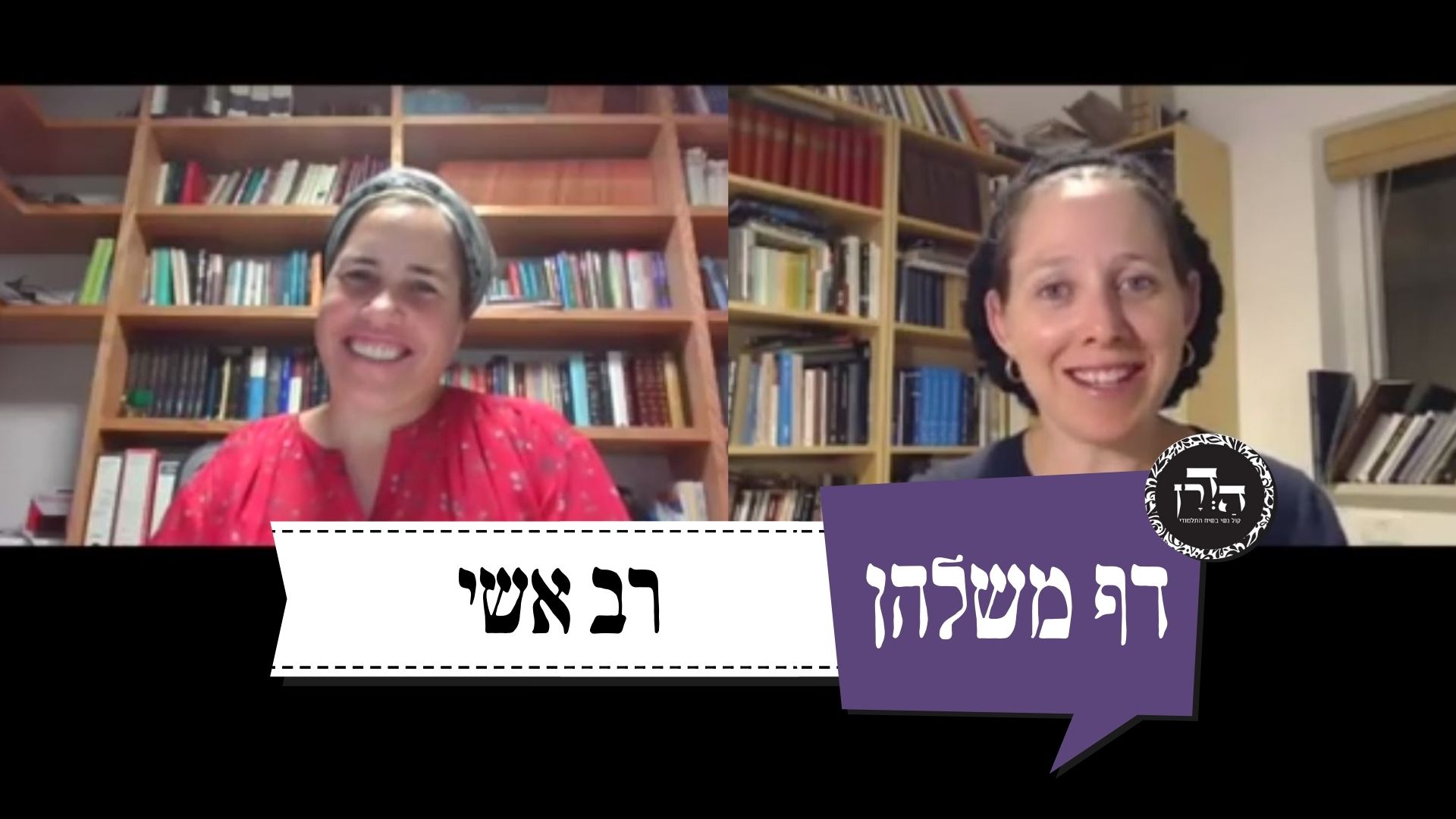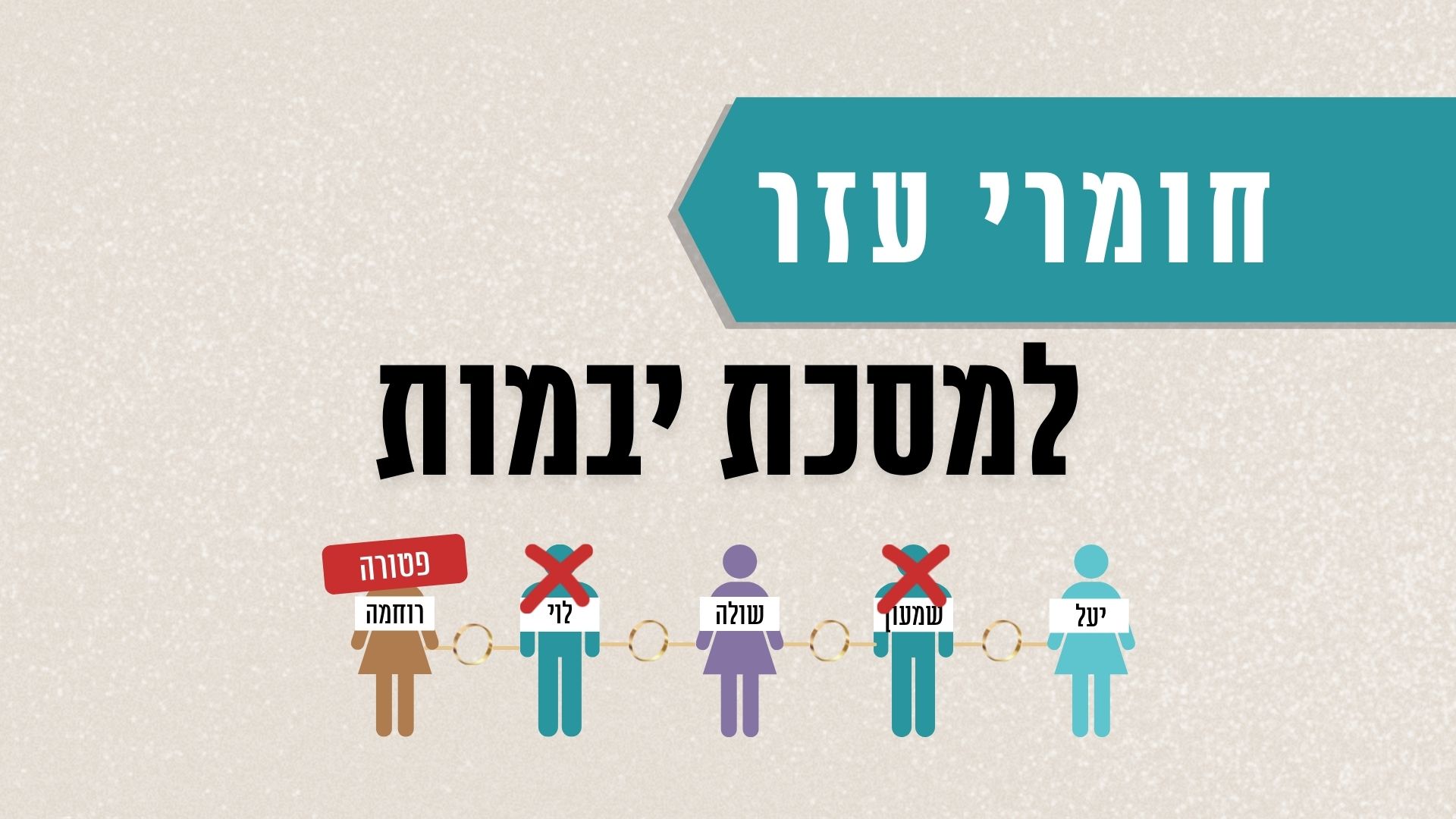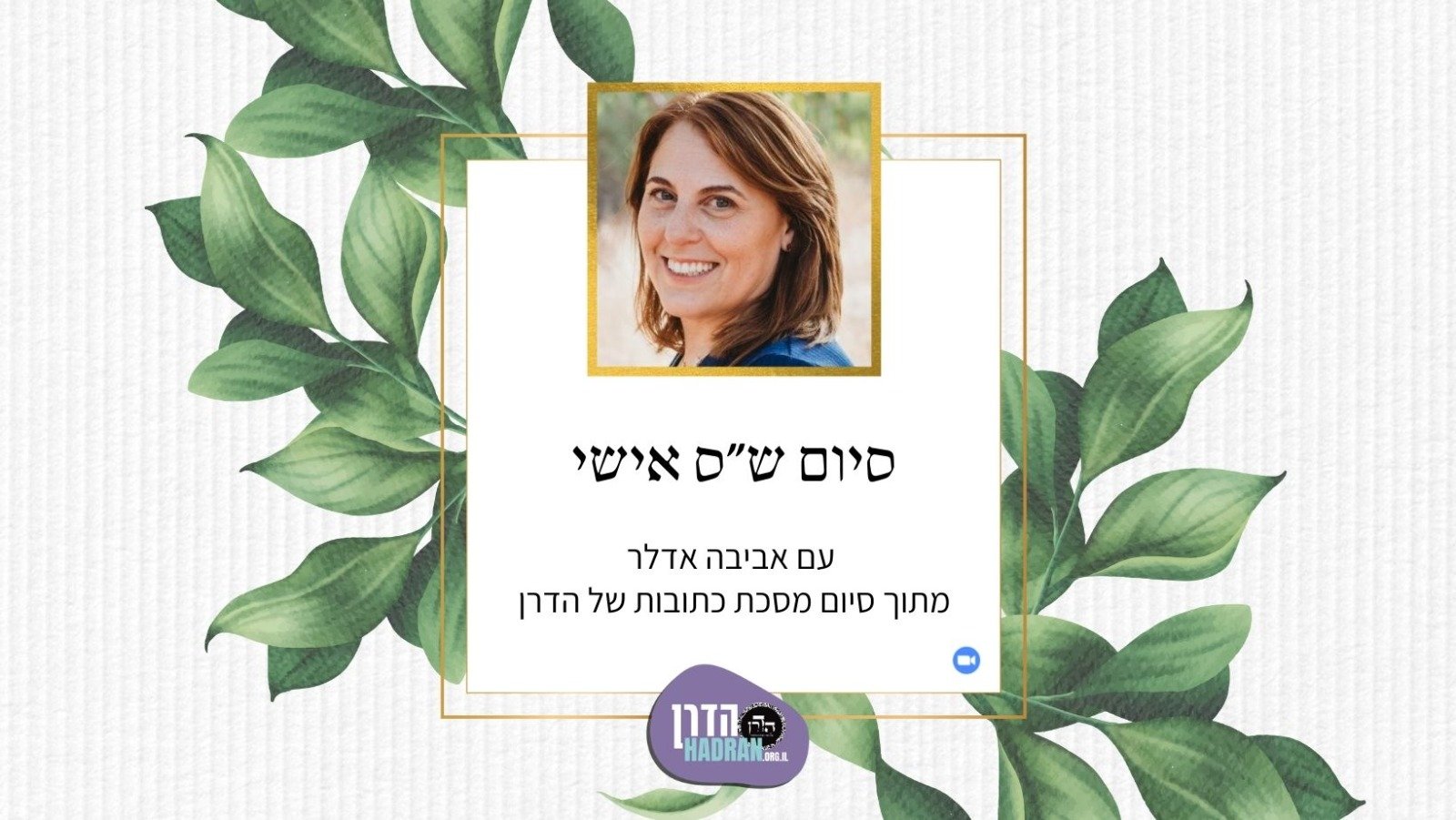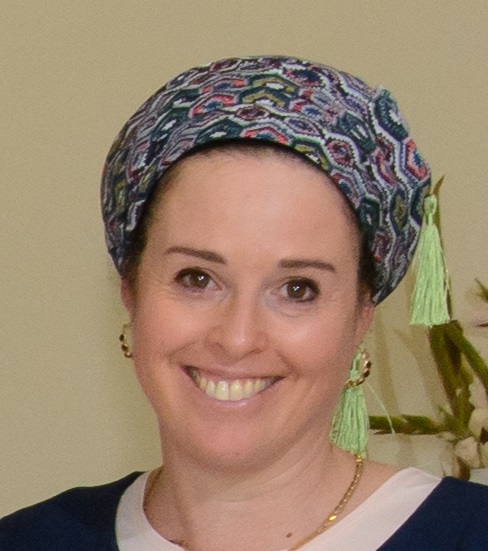כהגמרא מסיימת את הדיון לגבי מהו המקרה של משנתינו. ובתוך שיח זה יש דיון לשיטת ר’ יהושע אם חולין שנעשו על טהרת הקודש מעבירים טומאה כקדשים עצמם.
הלימוד השבוע מוקדש לזכות ולשלום הַיְימׇנוֹט אֱמוּנָה בַּת באנצ’י (קָסָאוּ) בת 11 שנעלמה במקום מגוריה בצפת, לפני שנתיים, ביום ט”ז אדר תשפ”ד (25.2.24), ולא נודעו עקבותיה.
הלימוד השבוע מוקדש למען ביטחון המדינה, החיילים והאזרחים, ולמען חירותו של העם האיראני. שנזכה בקרוב שיתקיים בנו הפסוק: "לַיְּהוּדִים הָיְתָה אוֹרָה וְשִׂמְחָה וְשָׂשֹׂן וִיקָר”.
רוצה להקדיש שיעור?

כלים
הלימוד השבוע מוקדש לזכות ולשלום הַיְימׇנוֹט אֱמוּנָה בַּת באנצ’י (קָסָאוּ) בת 11 שנעלמה במקום מגוריה בצפת, לפני שנתיים, ביום ט”ז אדר תשפ”ד (25.2.24), ולא נודעו עקבותיה.
הלימוד השבוע מוקדש למען ביטחון המדינה, החיילים והאזרחים, ולמען חירותו של העם האיראני. שנזכה בקרוב שיתקיים בנו הפסוק: "לַיְּהוּדִים הָיְתָה אוֹרָה וְשִׂמְחָה וְשָׂשֹׂן וִיקָר”.
כלים
העמקה
רוצה להבין מה באמת קורה מתחת לפני השטח של הסוגיה?
שיעורים, פודקאסטים והרחבות של מיטב המורות שלנו יפתחו לך עוד זוויות וכיווני חשיבה.
חדשה בלימוד הגמרא?
זה הדף הראשון שלך? איזו התרגשות עצומה! יש לנו בדיוק את התכנים והכלים שיעזרו לך לעשות את הצעדים הראשונים ללמידה בקצב וברמה שלך, כך תוכלי להרגיש בנוח גם בתוך הסוגיות המורכבות ומאתגרות.
פסיפס הלומדות שלנו
גלי את קהילת הלומדות שלנו, מגוון נשים, רקעים וסיפורים. כולן חלק מתנועה ומסע מרגש ועוצמתי.
חולין לד
בְּחוּלִּין שֶׁנַּעֲשׂוּ עַל טׇהֳרַת תְּרוּמָה, וְרַבִּי יְהוֹשֻׁעַ? לָא סָלְקָא דַּעְתָּךְ, דְּקָתָנֵי ״בָּשָׂר״, דְּאִי בִּתְרוּמָה – בָּשָׂר מִי אִיכָּא?
with regard to the case of non-sacred food items that were prepared on the level of purity of teruma and in accordance with the opinion of Rabbi Yehoshua. The Gemara responds: It should not enter your mind that the mishna is referring to a case of the level of purity of teruma, as the mishna teaches a case of the slaughter of animals and birds and consumption of their meat. And if the mishna is taught with regard to non-sacred food items that were prepared on the level of purity of teruma, is there meat eaten with the level of purity of teruma? The practice of preparing non-sacred food items on the level of purity of teruma is done only so that one will not treat actual teruma in the correct manner, and teruma is separated only from produce that grows in the ground.
אֶלָּא מַאי, בְּקָדָשִׁים? חַיָּה בְּקָדָשִׁים מִי אִיכָּא? בָּשָׂר בְּבָשָׂר מִיחַלַּף, בָּשָׂר בְּפֵירֵי לָא מִיחַלַּף.
The Gemara asks: Rather, what is the case in the mishna? Is it a case of non-sacred food items that were prepared on the level of purity of sacrificial food? Is there an undomesticated animal that can be sacrificed as an offering and its meat is sacrificial food? The Gemara answers: Although undomesticated animals cannot be sacrificed as an offering, there are those who would undertake to eat their meat only when prepared on the level of purity of sacrificial food because meat of an undomesticated animal is sometimes interchanged with meat of a domesticated animal. No one would undertake to eat meat only when prepared on the level of purity of teruma, because meat would not be interchanged with produce.
אָמַר עוּלָּא: חַבְרַיָּא אָמְרִין בְּחוּלִּין שֶׁנַּעֲשׂוּ עַל טׇהֳרַת הַקֹּדֶשׁ, וּדְלָא כְּרַבִּי יְהוֹשֻׁעַ.
Ulla said: My colleagues say that the mishna is referring to the case of non-sacred food items that were prepared on the level of purity of sacrificial food, and the mishna is not in accordance with the opinion of Rabbi Yehoshua, who says: Non-sacred food items that were prepared on the level of purity of teruma assume third-degree impurity, but non-sacred food items that were prepared on the level of purity of sacrificial food do not assume third-degree impurity.
וַאֲנָא אָמֵינָא רַבִּי יְהוֹשֻׁעַ הִיא, וְלָא מִיבַּעְיָא קָאָמַר: לָא מִיבַּעְיָא חוּלִּין שֶׁנַּעֲשׂוּ עַל טׇהֳרַת קֹדֶשׁ דַּחֲמִירִי דְּאִית בְּהוּ שְׁלִישִׁי, אֶלָּא אֲפִילּוּ חוּלִּין שֶׁנַּעֲשׂוּ עַל טׇהֳרַת תְּרוּמָה נָמֵי אִית בְּהוּ שְׁלִישִׁי.
Ulla continues: And I say that the mishna is in accordance with the opinion of Rabbi Yehoshua, and when he said that non-sacred food items that were prepared on the level of purity of teruma assume third-degree impurity, he is speaking utilizing the style of: It is not necessary. It is not necessary to say that in the case of non-sacred food items that were prepared on the level of purity of sacrificial food, which is stringent, that they have the capacity of assuming third-degree impurity. Rather, even non-sacred food items that were prepared on the level of purity of teruma also have the capacity of assuming third-degree impurity.
מַאן חַבְרַיָּא? רַבָּה בַּר בַּר חָנָה הִיא, דְּאָמַר רַבָּה בַּר בַּר חָנָה אָמַר רַבִּי יוֹחָנָן: מַאי אַהְדַּרוּ רַבִּי אֱלִיעֶזֶר וְרַבִּי יְהוֹשֻׁעַ לַהֲדָדֵי?
The Gemara asks: Who are the colleagues to whom Ulla referred? It is Rabba bar bar Ḥana, as Rabba bar bar Ḥana says that Rabbi Yoḥanan says: What did Rabbi Eliezer and Rabbi Yehoshua reply to each other? The differences between their opinions are twofold. First, Rabbi Eliezer holds that one who eats food with first-degree impurity assumes first-degree impurity, while according to Rabbi Yehoshua he assumes second-degree impurity. Second, Rabbi Eliezer holds that one who eats food with third-degree impurity assumes third-degree impurity, while according to Rabbi Yehoshua he assumes second-degree impurity vis-à-vis sacrificial food but not vis-à-vis teruma.
אָמַר לוֹ רַבִּי אֱלִיעֶזֶר לְרַבִּי יְהוֹשֻׁעַ: מָצִינוּ אוֹכֵל חָמוּר מִן הָאוֹכֶל, דְּאִילּוּ נִבְלַת עוֹף טָהוֹר בַּחוּץ – לֹא מְטַמֵּא, וְאִילּוּ אוֹכְלָהּ מְטַמֵּא בְּגָדִים אַבֵּית הַבְּלִיעָה, וְאָנוּ הֵיאַךְ לֹא נַעֲשֶׂה אוֹכֵל כַּמַּאֲכָל?
Rabbi Eliezer said to Rabbi Yehoshua: The basis for my opinion that one assumes the level of impurity of that which he ate is that we found a case where the halakha of the one who eats a food item is more stringent than the halakha of the food itself. As, the carcass of a kosher bird on the outside, i.e., when one comes into contact with it, does not impart ritual impurity, while one who eats the carcass of the kosher bird renders his garments impure when the food is in his throat. And we, in light of that, how will we not deem one who eats the impure item to be on a level of impurity at least like that of the food that he ate?
וְרַבִּי יְהוֹשֻׁעַ: מִנִּבְלַת עוֹף טָהוֹר לָא גָּמְרִינַן, דְּחִידּוּשׁ הוּא. אֶלָּא מָצִינוּ שֶׁהַמַּאֲכָל חָמוּר מִן הָאוֹכֵל, דְּאִילּוּ מַאֲכָל בִּכְבֵיצָה, וְאוֹכֵל עַד דְּאָכֵיל כַּחֲצִי פְרָס, וְאָנוּ הֵיאַךְ נַעֲשֶׂה אוֹכֵל כַּמַּאֲכָל?
And Rabbi Yehoshua responded that we do not derive other cases from the case of the carcass of a kosher bird, because it is a novel ruling that cannot serve as a paradigm. Rather, we found that the halakha of food is more stringent than the halakha of the one who eats it, as food becomes impure if its measure is that of an egg-bulk, and one who eats impure food does not become impure until he eats half of a half-loaf. And we, in light of that, how will we deem one who eats the impure item to be on a level of impurity like that of the food that he ate?
וְרַבִּי אֱלִיעֶזֶר: טוּמְאָה מִשִּׁיעוּרִין לָא גָּמְרִינַן, וְעוֹד – לִדְבָרֶיךָ שֶׁאַתָּה אוֹמֵר עַל רִאשׁוֹן שֵׁנִי – יָפֶה אַתָּה אוֹמֵר, שֵׁנִי שֵׁנִי לְמָה?
And Rabbi Eliezer responded: We do not derive the relative stringency of ritual impurity from the relative size of halakhic measures, as measures are not indicative of stringency or leniency. And furthermore, according to your statement, that which you say with regard to one who eats food with first-degree ritual impurity, that he assumes second-degree impurity, what you say is well. But that which you say with regard to one who eats food with second-degree impurity, that he assumes second-degree impurity, why is that the case? It contradicts your reasoning.
אָמַר לוֹ: מָצִינוּ שֶׁהַשֵּׁנִי עוֹשֶׂה שֵׁנִי עַל יְדֵי מַשְׁקִין.
Rabbi Yehoshua said to Rabbi Eliezer: We found that food with second–degree impurity renders other food impure with second-degree impurity by means of liquids. Liquids that come into contact with food with second-degree impurity render other food with which they come into contact impure with second-degree impurity.
אָמַר לוֹ: וְהָא מַשְׁקִין נָמֵי תְּחִלָּה הָווּ, דִּתְנַן: כׇּל הַפּוֹסֵל בִּתְרוּמָה מְטַמֵּא מַשְׁקִין לִהְיוֹת תְּחִלָּה, חוּץ מִטְּבוּל יוֹם.
Rabbi Eliezer said to him: But aren’t those liquids also impure with first-degree ritual impurity through contact with an item impure with second-degree impurity? As we learned in a mishna (Para 8:7): Any item with second-degree ritual impurity that disqualifies teruma renders liquids impure with first-degree ritual impurity. These liquids assume a degree of impurity greater than that of the item that rendered them impure. This rabbinic decree applies to all people and items with second-degree impurity except for one who was ritually impure who immersed that day and is waiting for nightfall for the purification process to be completed. Liquids with which he comes into contact follow the standard course of transmitted impurity and assume third-degree impurity, one level below his own impurity.
וְעוֹד, שְׁלִישִׁי שֵׁנִי לָמָה?
Rabbi Eliezer questioned the next segment in the ruling of Rabbi Yehoshua: And furthermore, that which you say with regard to one who eats food with third-degree impurity, that he assumes second-degree impurity vis-à-vis sacrificial food, why is that the halakha? It contradicts your reasoning.
אָמַר לוֹ: אַף אֲנִי לֹא אָמַרְתִּי אֶלָּא בִּתְרוּמָה, שֶׁטׇּהֳרָתָהּ
Rabbi Yehoshua said to Rabbi Eliezer: I too stated that one who eats food with third-degree impurity assumes second-degree impurity vis-à-vis sacrificial food only with regard to one who eats non-sacred food items that were prepared on the level of purity of teruma, as its state of purity
טוּמְאָה הִיא אֵצֶל הֶקְדֵּשׁ.
is impurity vis-à-vis sacrificial food. The Sages issued a decree that even one who is vigilant to partake of his teruma in a state of ritual purity is considered impure vis-à-vis one partaking of sacrificial food. Therefore, one who ate a food item that was prepared on the level of purity of teruma that had become impure with third-degree impurity assumes second-degree impurity, and he renders sacrificial food impure.
אָמַר רַבִּי זֵירָא אָמַר רַבִּי אַסִּי אָמַר רַבִּי יוֹחָנָן אָמַר רַבִּי יַנַּאי: הָאוֹכֵל שְׁלִישִׁי שֶׁל חוּלִּין שֶׁנַּעֲשׂוּ עַל טׇהֳרַת הַקֹּדֶשׁ – נַעֲשָׂה גּוּפוֹ שֵׁנִי לַקֹּדֶשׁ.
Rabbi Zeira says that Rabbi Asi says that Rabbi Yoḥanan says that Rabbi Yannai says: With regard to one who eats non-sacred food items that were prepared on the level of purity of sacrificial food, and these items had become impure with third-degree impurity, his body becomes impure with second-degree impurity vis-à-vis sacrificial food. He renders sacrificial food with which he comes into contact impure with third-degree impurity, and that food in turn disqualifies sacrificial food with which it comes into contact.
אֵיתִיבֵיהּ רַבִּי זֵירָא לְרַבִּי אַסִּי: שְׁלִישִׁי שֵׁנִי לַקֹּדֶשׁ, וְאֵין שֵׁנִי לַתְּרוּמָה, בְּחוּלִּין שֶׁנַּעֲשׂוּ עַל טׇהֳרַת תְּרוּמָה. עַל טׇהֳרַת תְּרוּמָה – אִין, עַל טׇהֳרַת הַקֹּדֶשׁ – לָא!
Rabbi Zeira raised an objection to the statement of Rabbi Asi from the statement of Rabbi Yehoshua: One who eats food with third-degree impurity assumes second-degree impurity vis-à-vis sacrificial food but does not assume second-degree impurity vis-à-vis teruma. This is stated in the case of non-sacred food items that were prepared on the level of purity of teruma. The Gemara infers: Yes, one is able to prepare items on the level of purity of teruma, but one is not able to prepare items on the level of purity of sacrificial food, as in the latter case the non-sacred food does not become impure at all.
אֲמַר לֵיהּ: לָא מִיבַּעְיָא קָאָמַר.
Rabbi Asi said to Rabbi Zeira: That inference is incorrect, as Rabbi Yehoshua is speaking utilizing the style of: It is not necessary. It is not necessary to say that in the case of non-sacred food items that were prepared on the level of purity of sacrificial food, which is stringent, they have the capacity of assuming third-degree impurity. Rabbi Yehoshua teaches that non-sacred food items that were prepared on the level of purity of teruma also have the capacity of assuming third-degree impurity.
וְהָא ״אַף אֲנִי לֹא אָמַרְתִּי אֶלָּא בִּתְרוּמָה״ קָאָמַר, אָמוֹרָאֵי נִינְהוּ, וְאַלִּיבָּא דְּרַבִּי יוֹחָנָן.
The Gemara objects: But didn’t Rabbi Yehoshua say to Rabbi Eliezer according to the explanation that Rabba bar bar Ḥana said that Rabbi Yoḥanan said: I too stated this only with regard to non-sacred food items that were prepared on the level of purity of teruma, indicating that he was not referring to non-sacred food items that were prepared on the level of purity of sacrificial food. The Gemara explains: Rabba bar bar Ḥana and Rabbi Asi are amora’im, and disagree with regard to the opinion of Rabbi Yoḥanan, and they disagree about whether the statement of Rabbi Yehoshua was stated specifically with regard to non-sacred food items that were prepared on the level of purity of teruma, or whether it includes even those prepared on the level of purity of sacrificial food.
אָמַר עוּלָּא: הָאוֹכֵל שְׁלִישִׁי שֶׁל חוּלִּין שֶׁנַּעֲשׂוּ עַל טׇהֳרַת תְּרוּמָה – נִפְסַל גּוּפוֹ מִלֶּאֱכוֹל בִּתְרוּמָה.
§ Ulla says: One who eats non-sacred food items that were prepared on the level of purity of teruma and that are impure with third-degree impurity, his body is disqualified from the right to partake of teruma.
מַאי קָא מַשְׁמַע לַן? תְּנֵינָא: שְׁלִישִׁי שֵׁנִי לַקֹּדֶשׁ, וְאֵין שֵׁנִי לַתְּרוּמָה, בְּחוּלִּין שֶׁנַּעֲשׂוּ עַל טׇהֳרַת תְּרוּמָה. שֵׁנִי הוּא דְּלָא הָוֵי, הָא שְׁלִישִׁי הָוֵי.
The Gemara asks: What is Ulla teaching us? We already learn in the mishna cited earlier (33b) from tractate Teharot: One who eats food with third-degree impurity assumes second-degree impurity vis-à-vis sacrificial food, but does not assume second-degree impurity vis-à-vis teruma. This is stated in the case of non-sacred food items that were prepared on the level of purity of teruma. The Gemara infers: It is second-degree impurity that he does not assume, but third-degree impurity he assumes, and he is therefore disqualified from partaking of teruma.
אִי מֵהַהִיא, הֲוָה אָמֵינָא: לָא שֵׁנִי הָוֵי וְלָא שְׁלִישִׁי הָוֵי, וְאַיְּידֵי דְּאָמַר ״שֵׁנִי בַּקֹּדֶשׁ״ – אָמַר נָמֵי ״אֵין שֵׁנִי בִּתְרוּמָה״, קָא מַשְׁמַע לַן.
The Gemara answers: It was necessary for Ulla to teach this halakha, as if it was learned from that mishna, I would say that vis-à-vis teruma he assumes neither second-degree nor third-degree impurity, as there is no reason to deem the status of one who eats like that of the food that he ate. And perhaps it was only since Rabbi Yehoshua said that he assumes second-degree impurity vis-à-vis sacrificial food that he also said that he does not assume second-degree impurity vis-à-vis teruma. Therefore, Ulla teaches us that he assumes third-degree impurity and is disqualified from partaking of teruma.
אֵיתִיבֵיהּ רַב הַמְנוּנָא לְעוּלָּא: הָרִאשׁוֹן שֶׁבַּחוּלִּין טָמֵא וּמְטַמֵּא, וְהַשֵּׁנִי פּוֹסֵל וְאֵינוֹ מְטַמֵּא, וְהַשְּׁלִישִׁי נֶאֱכָל בִּנְזִיד הַדֶּמַע.
Rav Hamnuna raised an objection to the statement of Ulla from a mishna (Teharot 2:3): Non-sacred food that is impure with first-degree impurity is impure and renders teruma impure in the sense that this teruma disqualifies other teruma with which it comes into contact. Non-sacred food that is impure with second-degree impurity disqualifies teruma, but it does not render teruma impure, meaning that it renders the teruma itself impure, but not to the extent that the teruma can render other teruma impure. And food that is impure with third-degree impurity may be eaten by a priest in a stew that is a mixture containing spices of teruma.
וְאִי אָמְרַתְּ נִפְסַל גּוּפוֹ מִלֶּאֱכוֹל בִּתְרוּמָה, סָפֵינַן לֵיהּ מִידֵּי דְּפָסֵיל לֵיהּ לְגוּפֵיהּ? אֲמַר לֵיהּ: הַנַּח לִנְזִיד הַדֶּמַע,
And if you say that by partaking of food that is impure with third-degree impurity his body is disqualified from the right to partake of teruma, do we feed him a matter that invalidates his body from the right to partake of teruma? According to this, when eating the stew that contains food that is impure with third-degree impurity, he is disqualified from partaking of the spices of teruma that the mishna permits him to add to the stew. Ulla said to him: Leave the matter of stew that is a mixture containing spices of teruma,



































